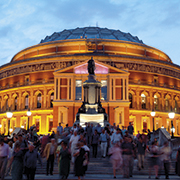The BBC Proms is undeniably one of the world’s greatest music festivals and this year was a special one for Faber Music’s composers, who were featured prominently with seven premieres.
Julian Anderson’s Harmony
Any Proms commission is an honour, but to be asked to compose the very first piece of the festival is a particular mark of distinction, and one which this year fell to Julian Anderson. The resulting piece, Harmony, a 5-minute work for chorus and orchestra, eschews the traditional blazing brass of a concert overture; instead it’s a peaceful and thoughtful reflection on music, time and eternity. The premiere was given by the BBC Symphony Orchestra and Chorus under Sakari Oramo.
‘[A] pristine musical poem… [featuring] mystic waves from the sopranos, a flurry of dark rumblings in characteristically imaginative orchestration and a succession of quasi-minimalist syncopations.’
Financial Times (Andrew Clark), 14 July 2013
‘Its brief four-minute swell left behind a definite flavour of something English, as if Delius had momentarily joined hands with French modernist chic.’
The Telegraph (Ivan Hewett), 12 July 2013
David Matthews’s A Vision of the Sea
Hearing gulls swooped, the tide swelled, and the shimmering light of a bold new sunrise filled the Royal Albert Hall with the premiere of David’s Matthews’s new symphonic tone poem A Vision of the Sea. The BBC Philharmonic and their principal conductor Junajo Mena were on finest form. ‘Most of the piece,’ writes Matthews, ‘was written at my house in Kent, where I am constantly aware of the sea.’ The 20-minute piece was commissioned by the BBC and marks Matthews’s 70th birthday this year.
‘…a substantial and attractive work… characteristic of Matthews’ style in its warm lyricism and sensuousness shot through with poignant rather than abrasive dissonance.’
Evening Standard (Barry Millington), 17 July 2013
‘…ravishingly coloured... the piece resembles an aural watercolour – woodwinds evoking gull cries, brass forecasting storm-squalls, percussion percolating into stillness – in which mood is paramount and orchestration is king.’
Financial Times (Andrew Clark), 17 July 2013
Thomas Adès’s Totentanz
With its jaw-dropping orchestral sonorities, its wild, whirling dances, and its moments of crystalline stillness, Thomas Adès’s Totentanz will live long in the memory. The 45-minute work, for orchestra and two singers, is based on a 15th century Lübeck frieze depicting the dancing figure of Death alongside every category of human society in strictly descending order of status, from the Pope to a baby. In Adès’s setting Death, a baritone – here Simon Keenlyside – asks his victims to join his macabre dance, they plead mercy, but their cries – sung by mezzo Christine Stoijn – go unheeded. Totentanz was commissioned by Robin Boyle in memory of Lutosławski and his wife, Danuta.
‘In all it was an immense achievement... This seemed a cultural event of the first magnitude.’
The Telegraph (Ivan Hewett), 18 July 2013
‘…one of the best concerts of the year… Adès’s score is mostly brutal, exploiting screeching high sonorities or grunting low ones, with a crippled, lurching momentum… Yet I found it thrilling: one of his best.’
The Times (Richard Morrison), 19 July 2013
Colin Matthews’s Turning Point
Colin Matthews’s 18-minute orchestral work Turning Point was commissioned by the Concertgebouw of Amsterdam and first performed there in 2007. It has since been performed by the Gürzenich-Orchester Köln and the Tanglewood Music Center Orchestra. This summer it received its UK premiere at the Proms in a stunning performance by the BBC National Orchestra of Wales and Thomas Sondergard.
‘…the ecstatic, richly detailed woodwind and brass writing has overtones of Mahler and Berg. It was beautifully done.’
The Guardian (Tim Ashley), 30 July 2013
‘…ingeniously constructed… it lived up to its title by switching halfway through from a frenetic mosaic of whirling motifs into a Gorecki-like wall of massive, immensely slow, mostly consonant string harmonies.’
The Times (Richard Morrison), 31 July 2013
(from [t]akte 2/2013]



